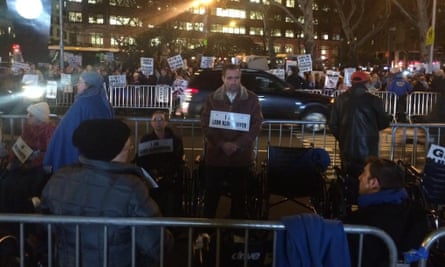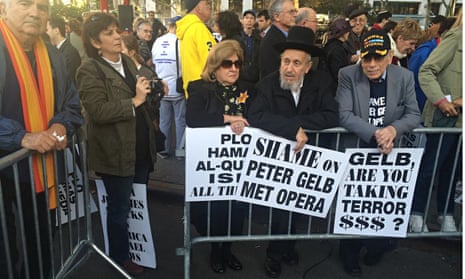The New York Metropolitan Opera’s staging of The Death of Klinghoffer, the first full production of the controversial John Adams opera in the city in 23 years, was met with boos and catcalls as the curtain went up on Monday night.
The Met’s performance of the opera, which has attracted claims of antisemitism since it premiered in Brussels in 1991, was repeatedly disrupted by protesters among the audience, who mounted what appeared to be a co-ordinated campaign from the start of the first half.
Cries of “shame on you” greeted conductor David Robertson as he took up the baton. At the end of a hijacking scene, a protestor repeatedly shouted “the murder of Klinghoffer will never be forgiven”.
The opera draws links between the displacement of the Palestinians by Israel in 1948 and the hijacking of the cruise liner Achille Lauro, during which a wheelchair-bound Jewish American, Leon Klinghoffer, was murdered. Its opponents believe the comparisons render it antisemitic.
During the periods of interruption, performers remained composed, waiting for the protests to die down before continuing. The protestors, occasionally applauded by some audience members, were either silenced or removed by security staff.
After a tense first half, the second act, which includes the depiction of Klinghoffer’s murder, was quieter, with a sole exclamation of “this is shit!” by a woman in the stalls, who was hushed by the rest of the audience.
As the audience arrived outside the Lincoln Center, protesters brandished signs with slogans such as “tenors and terrorists don’t mix”. Critics, who were out in droves on a cold night in New York, call the work antisemitic and want the show cancelled.
“We’re here tonight to mark one of the cultural low points in this city,” said former US attorney general Michael Mukasey.
Across the street from the rally were about 100 demonstrators in wheelchairs honouring Klinghoffer, who used a wheelchair. They had royal blue blankets draped over their legs and signs around their necks reading: “I am Leon Klinghoffer.” Behind them, the grand theatres of the Lincoln Center complex, including the Metropolitan Opera, which has insisted that the play is not antisemitic and is an artistic masterpiece.
“The rumours and inaccuracies about the opera and its presentation at the Met are part of a campaign to have it suppressed,” the Met said in a statement. “Klinghoffer is neither antisemitic nor does it glorify terrorism. The Met will not bow to this pressure.”
While the angry rhetoric functioned as an opening act to the opera, in recent years the work was only met with minor protests in London, St Louis, Missouri and Long Beach, California. Still, the work has not been performed in full in New York since it received its US premiere at the Brooklyn Academy of Music in 1991.
“The Met and those who decide to go to see this production have every right to do so and it would be hypocritical and anti-American for us to interfere with them and to stop them,” said former New York City mayor Rudy Giuliani. “We also have a right, just as strong and just as compelling, to point out the historical inaccuracy and historical damage this contributed to.”

He said that he has been an opera fan for 57 years and has seen more then 100 productions. He, unlike other protesters who deliberately avoid or have never seen the opera, owns the Klinghoffer CD and applauded its music. “I will continue to be a patron but with severe regret over this grave decision,” said Giuliani, who left the podium to the audience’s cheers of “four more years”.
The New York Police Department had more than 40 officers stationed around the rally, including members of its bomb squad. The rally was peaceful and included an opera singer belting a custom song that began “stop this hatred towards our people”.
The Met said that while the play deals with a complex act of violence that does not mean it should not be performed.
“As a cultural institution, we unwaveringly support the freedom of artists to create responsible work that addresses difficult contemporary topics,” the Met said. “We firmly believe that artistic explorations of politically charged subjects should be presented to the public without fear of censorship.”
Klinghoffer ticketholders had to explore a maze of police barricades and checkpoints to enter the plaza that houses the opera house. Some protesters managed to get through, carrying signs and handing out brochures denouncing the performance.
With less than 30 minutes to go before the performance began, protesters shouted “shame” at the crowd of showgoers who had gathered on the other side of the barrier ahead of the show. A speaker also condemned Alice Goodman, the opera’s librettist, who in 2012 told the Guardian that creating the show ended her career.
Whether any minds were changed on either side was unclear, but the end of the performance was was greeted with a standing ovation for the cast and conductor. There was a palpable feeling of relief that this most controversial of nights at the opera had passed without more serious disruption.









Comments (…)
Sign in or create your Guardian account to join the discussion